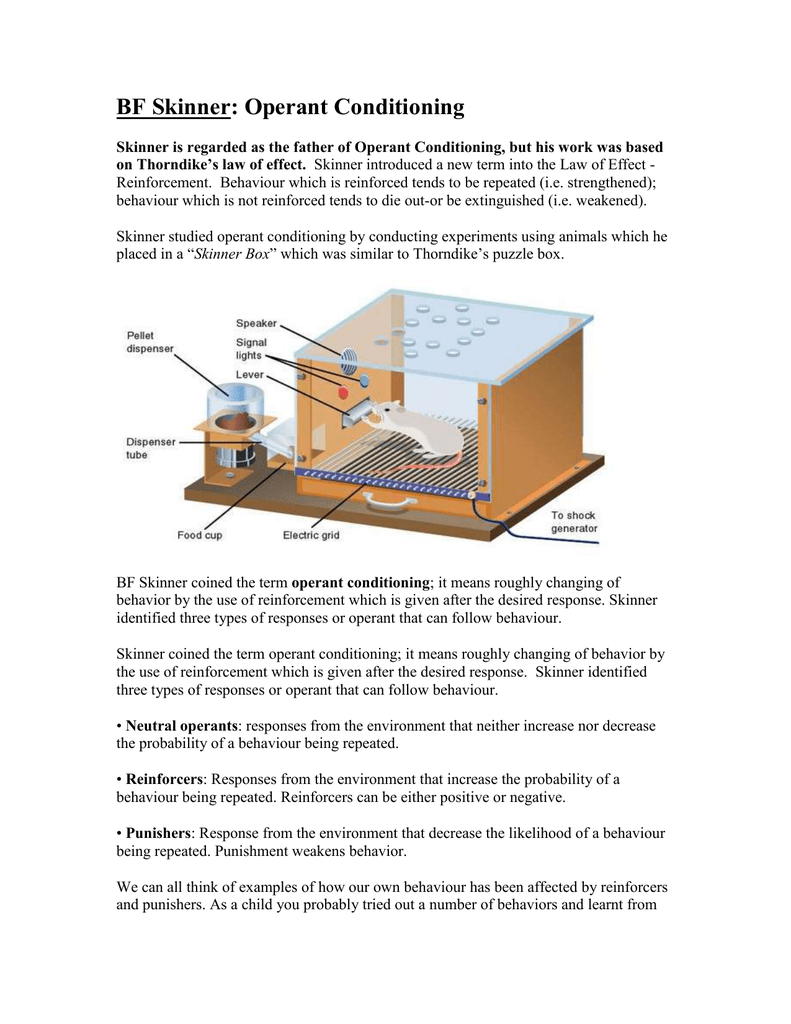BF Skinner is regarded as the father of operant conditioning and introduced a new term to behavioral psychology reinforcement. B involuntary behaviors that were subject to the laws of learning but operated independently.

Doc Skinner Operant Conditioning Manelyn Binatao Academia Edu
Operant conditioning in his opinion better described human behavior as it examined causes and effects of intentional behavior.

. 1785 Skinner coined the term operant to describe. A active behaviors that operate on the environment to generate consequences. Asked Feb 5 2019 in Psychology by amenahnomani.
It means roughly changing of behavior by the use of reinforcement which is given after the desired response. Operant conditioning is a method of learning that occurs through rewards and punishments for behavior. Skinner maintained that learning occurred as a result of the organism responding to or operating on its environment and coined the term operant conditioning to describe this phenomenon.
Skinner is based upon the idea that. Through operant conditioning an individual makes an association between a particular behavior and a consequence. Answered Feb 5 2019 by fpltdc716.
True Answer Correct g120 the operational relationship between a conditioned stimulus as it relates to a reinforcer. Skinner 1938 coined the term operant conditioning. Skinner coined the term operant conditioning which is why it is also referred.
B the operational relationship between a conditioned stimulus as it relates to a reinforcer. Skinner believed our behaviors was. Skinner 1971 coined the term operant conditioning to describe a form of learning where a voluntary response is strengthened or weakened depending on the whether there are positive or negative consequences.
Active behaviors that operate on the environment to generate consequences. The strengthening of a response occurs through reinforcement. A active behaviors that operate on the environment to generate consequences.
Skinner coined the term operant to describe. The term operant conditioning 1 was coined by B. 224 found a process of conditioning that was different from Pavlovs and much more like most learning in daily life.
He did extensive research with animals notably rats and pigeons and invented the famous Skinner box in which a rat learns to press a lever in order to obtain food. Active behaviors that operate on the environment to generate consequences. An operant con be defined as.
Operant conditioning was coined by behaviorist BFSkinner which is why you may occasionally hear it referred to as Skinnerian conditioningSkinner 1948 studied operant conditioning by conducting experiments using animals which he placed in a Skinner Box which was similar to Thorndikes puzzle box. Who coined the term operant to refer to behavior that acts-or operates-on the environment to produce specific consequences. Skinner in 1937 in the context of reflex physiology to differentiate what he was interested inbehavior that affects the environmentfrom the reflex-related subject matter of the Pavlovians.
G120 active behaviors that operate on the environment to generate consequences. C the operational relationship between a conditioned stimulus as it relates to a reinforcer. Incorrect g120 involuntary behaviors that were subject to the laws of learning but operated independently.
Skinner coined the term operant to describe active behaviors that operate on the environment to generate consequences In operant conditioning reinforcement is. Skinner believed that classical conditioning was too simplistic to be used to describe something as complex as human behavior. Skinner coined the term operant to describe.
Skinner coined the term operant to describe. Skinner 1953 coined the term operant. What came before the discovery research and development of operant conditioning was that of the theory of classical conditioning maintained by Skinners predecessors Watson and Pavlov.
Skinner coined the termoperant conditioningwhich involves changing a behavior using reinforcements given. Through operant conditioning an association is made between a behavior and a consequence for that behavior. Positive reinforcement _____ the likelihood of a behaviors being repeated.
Up to 24 cash back Skinner coined the term Operant Conditioning as a branch of Watsons Classical Conditioning and studied it by conducting experiments using animals namely rats placing them in what he called the Skinner Box Operant Conditioning consists of changing behaviour by the use of reinforcements which are given after the desired response is achieved. In operant conditioning terms Rogers superstitious behavior is a result of. The theory of BF.
Skinner coined the term _____ because behavior operates on the environment and changes it in some way. C involuntary behaviors subject to the laws of. Negative reinforcement _____ the likelihood of a behaviors being repeated.
Skinner studied operant conditioning by conducting animal experiments which he placed in aSkinner box similar to Thorndikes puzzle box. Asked Aug 23 2019. The term was novel but its referent was not entirely new.
Skinner used the term operant to signify any active behavior that operates upon the environment to generate consequences 1953Cherry 2013. Skinner identified three types of responses or operant that can follow behavior. To Skinner the most important form of learning was demonstrated by new behaviors that were actively emitted by the organism such as the active behaviors produced by Thorndikes cats in trying to escape the puzzle boxes.
Operant conditioning sometimes referred to as instrumental conditioning is a method of learning that occurs through rewards and punishments for behavior. Skinner coined the term operant to describe.

Skinner Operant Conditioning Theory Ppt

B F Skinner Operant Conditioning By The 1920s John B Watson And Other Behaviorists Were Becoming Influential Proposing New Forms Of Learning Other Ppt Download
0 Comments